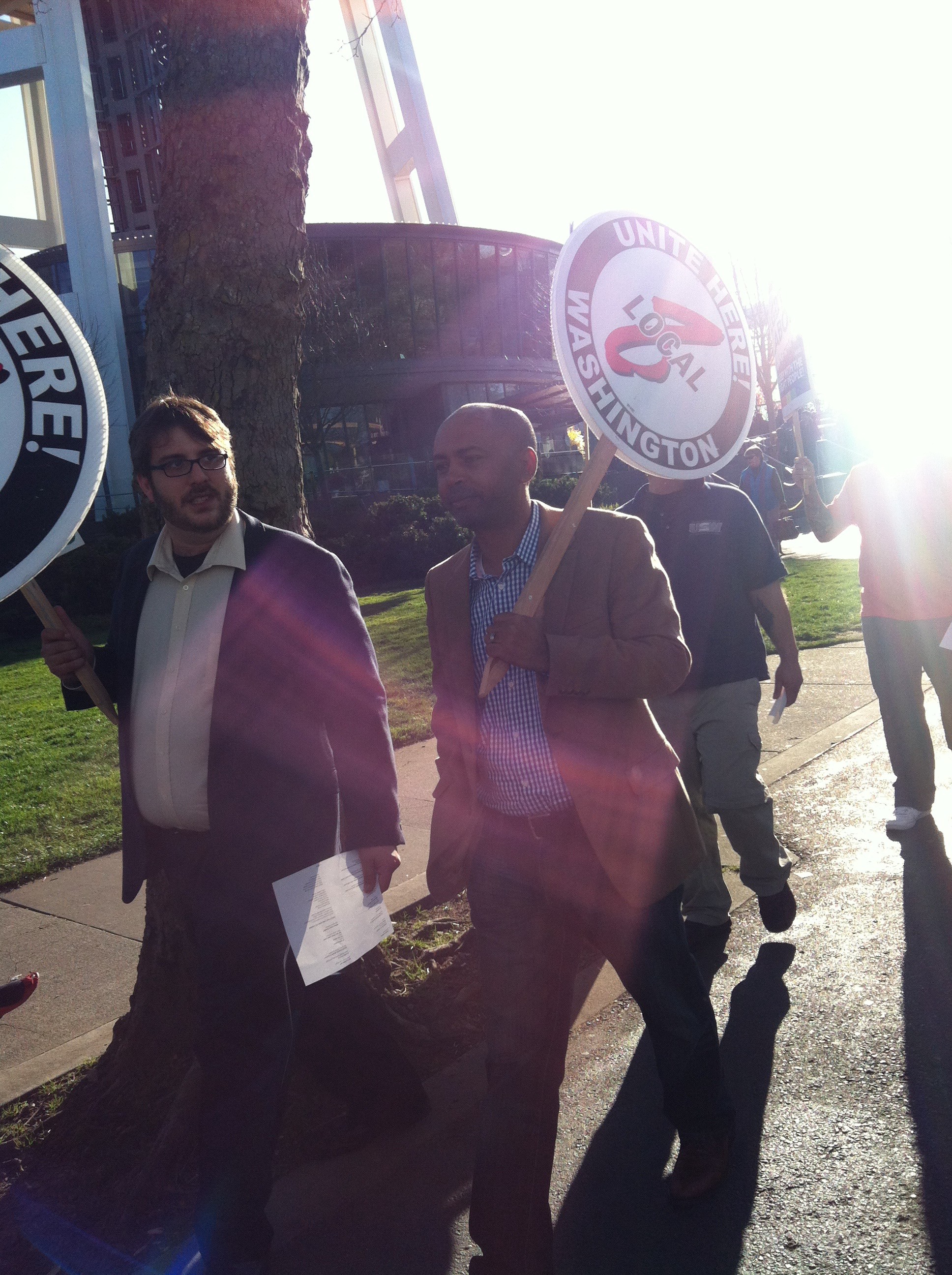
I came here in February, 2009, and there was one person who was vocal against us. I’m not going to name names, but they were loud.
The speaker is Julio Perez, director of the Orange County Labor Federation. He’s talking about the effort by former director Tefere Gebre to change labor’s status quo. Gebre has since gone on to win office as Executive Vice President of the AFL-CIO. But this was years ago, when Gebre’s tactics in Orange County hadn’t proved out. One of the big local unions within the OC Labor Fed didn’t like Gebre’s ideas. They liked the way things were, especially when it came to politics.
Everybody was used to it. The candidate would be inviting you. You get a check. You go to their fundraiser at some nonunion facility.
You’re not highlighted. But you go, you take your picture, you post it in your office and use it for your re-election.
Tefere stopped all that. He said, ‘I’m not going. We’re going to host our own humble fundraisers to endorse candidates. We’re going to make them come to our house. And all our members will be invited, too, so anyone can say whatever they want.’
Previously, local Democratic politicians would court labor support by going to the office of one of the locals. Other labor leaders in the OC would simply respond to invitations from candidates to come to fundraisers.
Some of these labor leaders didn’t like Tefere’s ideas. They would argue about archaic things. We can’t do this, because of blah blah blah. They’d say, ‘You can’t appeal to the public here. This isn’t some liberal bastion blah blah blah.’
At one meeting of the executive council of the OC Labor Fed, things came to a head. A group of the old-school union leaders demanded a return to the old ways, but the council voted against them. And then the main opponent of reform pulled the ultimate power card: they threatened that if the Labor Fed didn’t go back to the old ways, they’d quit the federation. Perez was stunned. He remembers asking Gebre what to do.
Here’s what Tefere said, “Dude, sometimes you have to cut your losses.”
Almost every other labor leader Perez had ever met put unity above all else. Watching that big affiliate union walk away was one of the hardest things Perez ever did. At about the same time, Gebre stepped up to help another local in the county which was trying to organize undocumented workers at a trash-sorting facility.
He was out there at 6 in the morning. He’d start speaking Spanish. He told them, ‘Standing up together in a union will change your life.’ This wasn’t bull. They said, ‘If that black guy from Ethiopia can do it, we can do it, too.’ When they first started organizing, do you know what they asked for? It wasn’t health care. It wasn’t wages. Imagine this: It was bathroom breaks.
Months earlier, the sanitation company had fired workers who tried to organize, but this time Tefere and Perez worked with a coalition of faith leaders to persuade the company to let the workers decide for themselves.
We’d been building a coalition. We moved it into action. ‘These immigrant workers need you!’ We helped those workers with rental assistance, with boxes of food.
The union drive ended in victory and a first contract, and the fired workers won their jobs back. Meanwhile, the OC Labor Fed had hired fulltime canvassers to walk the county, registering voters and building a database. Led by Gebre, the staff also began to offer free civics classes to the public. To drum up enough people for the first few classes, Gebre and Perez handed out flyers after PTA meetings at local schools.
Once the immigrant community saw the support, workers at all the sanitation companies wanted to organize. We started to win. We started to move the needle. We’d still get some of the same comments: Why are we spending Labor Fed resources on registering voters? Let me put it this way: ‘Hey, we need voter registration. Because that’s how we get politicians coming to us.’
With workplace wins, a voting network and a full-time canvass, the OC Labor Fed worked long and hard to turn one of the most politically conservative strongholds in America into a battleground where progressive ideas and candidates contest for power. Groups of empowered local parents demanded and won crossing guards at dangerous intersections near public schools. Others won office to local school boards, city councils and county boards and commissions. Activism in the county’s immigrant communities rose.
We went from zero to 60, but it’s kind of funny. Even when we were kicking ass, people didn’t stop doubting until Tefere goes to the AFL-CIO’s national office of the Executive Vice President. All of a sudden, they’re like, ‘I guess the CLC is doing something really right!’
Today, programs from the Orange County Federation of Labor are being run statewide across California, and as a national labor leader Gebre has taken his experience and models to labor groups all across the country. For decades, it was the opposite: corporate-funded activists in Orange County produced conservative, anti-worker and anti-government movements like the John Birch Society and others.
The lesson is: Sometimes you’ve got to call the question on fundamental issues, on what direction we’re headed and what kind of movement we aspire to be. If that means some will choose to walk away, so be it, because the coalition of the willing must move forward.
by Julio Perez, as told to Robert Struckman

